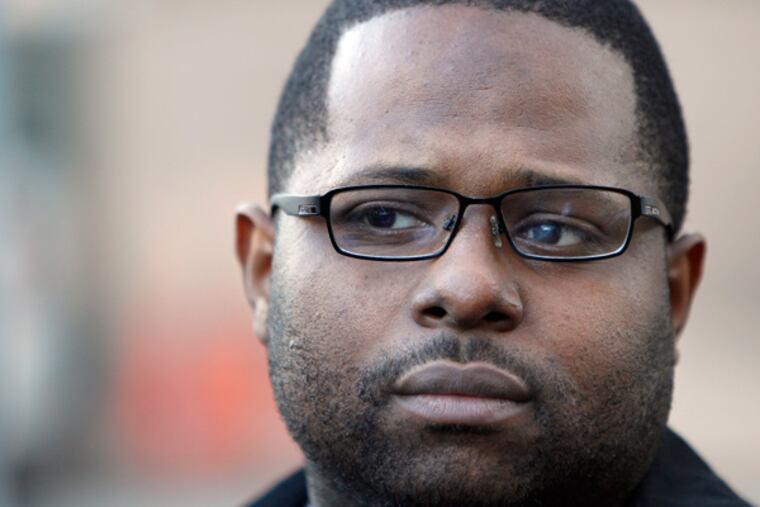Insider explains 'consideration' in Traffic Court
Considering his phone logs alone, Judge Willie Singletary might easily have been mistaken for more than a minor functionary in the city's judiciary.

Considering his phone logs alone, Judge Willie Singletary might easily have been mistaken for more than a minor functionary in the city's judiciary.
Congressmen, councilwomen, and state representatives alike routinely rang his chambers - some multiple times a month, all seeking help with that equal-opportunity annoyance: traffic tickets.
On the other end of the line for most of those calls until 2011 was Tonya Hilton, Singletary's personal secretary, who took the stand Thursday in the third day of the federal fraud and conspiracy trial of her former boss and four other ex-judges of Philadelphia Traffic Court.
"Some people who broke the law had to pay," Hilton said, in clipped, matter-of-fact tones. "Others didn't."
For more than three hours, Hilton, testifying under a grant of government immunity, laid bare the Traffic Court's purported system for doling out favors to the politically connected.
Prosecutors allege that the judges routinely extended favorable treatment to friends, family, and political allies, costing the city and state untold revenue.
And Hilton, who worked for Singletary from 2009 to 2011, didn't hesitate Thursday to name names.
Congressman Robert Brady? His office called three or four times a month, she said.
James Fenton, an aide to Councilwoman Jannie Blackwell? Twice a month or more.
"I knew his voice," Hilton said. "He would just say, 'I have someone for you.' "
Councilman Kenyatta Johnson, then a Democratic state representative whose district included Point Breeze and Kingsessing, didn't bother with intermediaries, she said. He called Singletary directly.
Dressed in a gray pinstripe suit and pink bow tie, Singletary, 33, sat impassively Thursday as his former assistant aired her secrets in court. He and the other former judges maintain that the government's allegations don't constitute a crime and that the defendants never accepted bribes or favors in exchange for special consideration of tickets.
For his part, Brady has repeatedly denied anyone on his staff ever sought to fix a ticket. Blackwell could not be reached for comment Thursday. And Fenton and Johnson, both on the government's witness list for trial, have been advised not to talk publicly about the case.
In a statement late Thursday night, Johnson said he was "deeply troubled by the fact that my name continues to be mentioned in connection with this case."
"I have never sought 'special consideration' or favors from anyone at Traffic Court," Johnson said. He cited two occasions while he was a state representative in which he contacted Traffic Court on behalf of constituents with questions but said neither occasion constituted a request for special treatment.
According to Hilton, those callers to Singletary's chambers never mentioned they were looking for ticket-fixing anyway. As was custom in the Traffic Court halls, she said, they would ask only for "consideration." Or they'd simply provide names, citations, and court dates.
Hilton and those who held similar jobs for the court's other judges took care of the rest. Names were shuttled between judicial chambers on folded 3-by-5 index cards. Hilton testified that she marked those cases that landed on Singletary's docket on a special calendar.
Each morning before court began, she separated the files marked for "consideration" in their own pile and placed them upside down on the bench.
What would happen to those cases? prosecutors asked Thursday.
"They would be dismissed," Hilton said.
She told jurors Thursday that she knew the process was illegal but that it worked with such precision, she didn't think twice about requesting special consideration when her own nephew, Dwight Snead, received a ticket.
The case was assigned to Judge Robert Mulgrew, who knocked down the fine and lessened the charge so Snead wouldn't receive points on his driving record.
But Hilton said Thursday that she was upset that Mulgrew didn't dismiss the ticket outright and later questioned the judge's secretary about it - a conversation Singletary's lawyer, William J. Brennan, seized on during cross-examination.
As testimony has focused on his client, Brennan has repeatedly stressed that Singletary alone assessed more than $7 million in fines in his last three years on the bench. What's more, the lawyer has emphasized again and again that no one ever asked Singletary to fix a ticket, asking only for "consideration," and that such requests were so routine that no one considered them to be a crime.
"You didn't think you were committing a crime when you went to [Mulgrew's secretary] and asked for more, did you?" he asked Hilton on Thursday.
No, she replied.
To that, prosecutor Anthony Wzorek responded with a series of simple queries.
If it wasn't a crime, why separate the index cards? Why were the cards destroyed later? And why did the process go unspoken?
Testimony is expected to resume Friday.
215-925-2649![]() 215-925-2649
215-925-2649